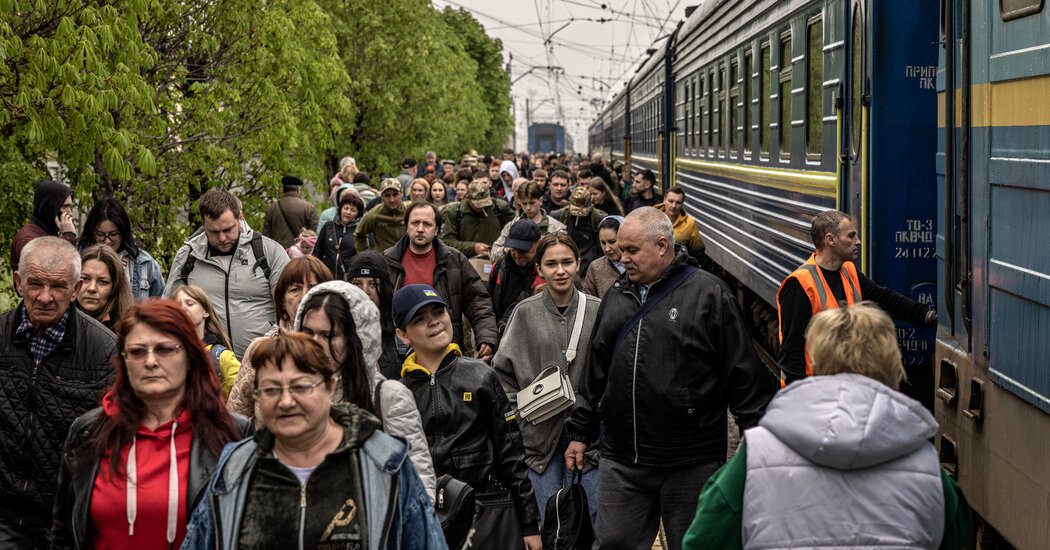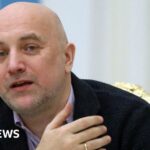Global Courant 2023-05-07 14:00:33
At night, a new sound blows through the open windows in this city at the front: children yelling at each other down the street, even long in the dark.
The markets are full. Sales at the local bicycle shop are booming. Red tulips, planted by hand, are bursting everywhere.
It is remarkable – “Unrecognizable,” said a city official – how different this small town in eastern Ukraine feels from a year ago. Last summer, Pokrovsk was a ghostly landscape of boarded-up houses and bushy gardens. There was no one around. Now it’s hard to take a few steps without passing someone on the sidewalk.
Outside of Pokrovsk nothing has changed. The front line is still 30 miles away. Ukrainians are still dying en masse. One of the largest armies in the world, that of the Russian Federation, still bombards cities while they sleep, trying to take as much territory as possible, at a terrifying cost.
But what has changed – and it reflects something broader happening in small towns across this vast country – is people’s calculations. How much danger are they willing to accept? What’s best for them and their families? How should they accommodate the war on a daily basis? The answers to these questions seem different this year and many people have come to the same decision without consulting each other.
It’s resilience, yes, but perhaps also something a little less glossy: resignation.
“The war is here. There is no safe place in Ukraine. So you better get on with it,” said Dr. Natalia Medvedieva, a general practitioner who tried to live with her son in a safer place in western Ukraine, but came back here a few months later.
And home is home.
“It’s hard to describe what’s so special about home,” says Pavel Rudiev, an engineer at Pokrovsk’s small railway station. “It’s where everything is familiar, where you know people, where you have friends.”
When Russia invaded Ukraine in February 2022, this principle did not apply. More than 13 million Ukrainians – a third of the country – fled their homes. But as time passed, it became harder to stay away.
“I was almost out of money,” says Iryna Ilina, a fitness instructor and beautician, who shares a common struggle of the displaced. She recently returned to Kramatorsk, another city not far from the frontline where she owns an apartment. She struggled to pay her rent in Pavlohrad, the safer town where she lived.
Many people said it was difficult to find work when they were displaced. “And I have to work,” said Dr. Medvedieva. “I have my life.”
Ukrainians have been returning at a fairly steady pace since last summer. More than 5.5 million have gone home, according to the International Organization for Migration, and not only to big cities like Kiev, the capital, or Dnipro, but also to small towns, even those directly behind the front lines.
Of course there is concern. Dr. Medvedieva has a bag full of her documents, money and some clothes. Viktoriia Perederii, a veterinarian, who returned to Pokrovsk last year after trying to live in central Ukraine, said many families bring her their pets to get clean health certificates for international travel in case they have to leave in a hurry.
“It’s difficult to assess the risks,” she said. “There is no safe place in Ukraine. Look at Uman,” she added, referring to the recent rocket attack that killed 25 people in a city that until then was considered perfectly safe by many Ukrainians.
At this time of year, Pokrovsk basks in spring. Petals of white cherry blossoms delicately flutter through the air and pile up along the curb in pretty garlands. The long side streets, lined with modest one-story houses with gabled roofs, smell of freshly turned earth. In the gardens outside, women in aprons and headscarves plant flowers – not something you do when you’re about to pack up and flee.
“Business is good,” says Larysa Titorenko, a seed seller in Pokrovsk’s busy central market. Her racks of brightly decorated packages moved quickly – marigolds, melons, radishes, carrots, and about eight varieties of cucumber.
Then tears welled up in her eyes. Her daughter’s home had recently been destroyed in a front-line town not far away. “I’m okay, really,” she insisted, wiping her eyes with her sleeve.
This duality is everywhere. People at war do something most people in the world don’t have to do – they always keep two big thoughts in their heads: live life as fully and richly as possible and at the same time make plans to turn it upside down.
Since last summer, the Russians have cut out Bakhmut, moved closer to Avdiivka, and razed Marinka—all towns about an hour away. The front line is slowly approaching. You constantly hear thuds, almost as if doors are closing.
But people carry on as if it were a distant thunderstorm. In a park by a pond near the city center, teenage girls make dandelion halos, as they have done for centuries, and TikTok dance videos.
Nearby, men pump iron in an immaculate open-air gym with rows of high-end weight machines, exercise bars, and even padded arm wrestling tables. They parade about with wide postures, cheeks red, chest puffed up. If you’ve occasionally Photoshopped a tank being towed by on a car transporter, it might look like California.
Pokrovsk is a mining town; many men dig coal here for a living. Before the war, the population was about 50,000. It dropped to about 30,000 last spring, as so many people across the country fled west. Now it has risen again — to 57,000, actually, said Serhiy Dobriak, the head of the Pokrovsk military administration. In addition to the residents who have returned, others from surrounding hotspots, Avdiivka or even Mariupol, have flocked.
Before the war, Pokrovsk had big plans. A billboard rising from a muddy intersection shows a schematic drawing of new office towers and lots of lights. “But we have to be realistic,” Mr Dobriak said. “We will most likely be a militarized zone.”
No one here expects the war to end soon. “Years” is the prevailing prophecy. Some fear that accepting it, the idea that life must go on no matter what, means there will be less pressure to end it.
A military convoy trudged past an intersection, leaving behind a haze of diesel haze. Not far behind, a boy pedaled furiously on his bicycle, determined to catch up with his friends.
It was evening, warm and the air was fresh and felt wonderful on exposed skin. It’s such a great time of year that no one wanted to go in, even as curfew approached.
Olha Kotiuzhanska contributed reporting.




